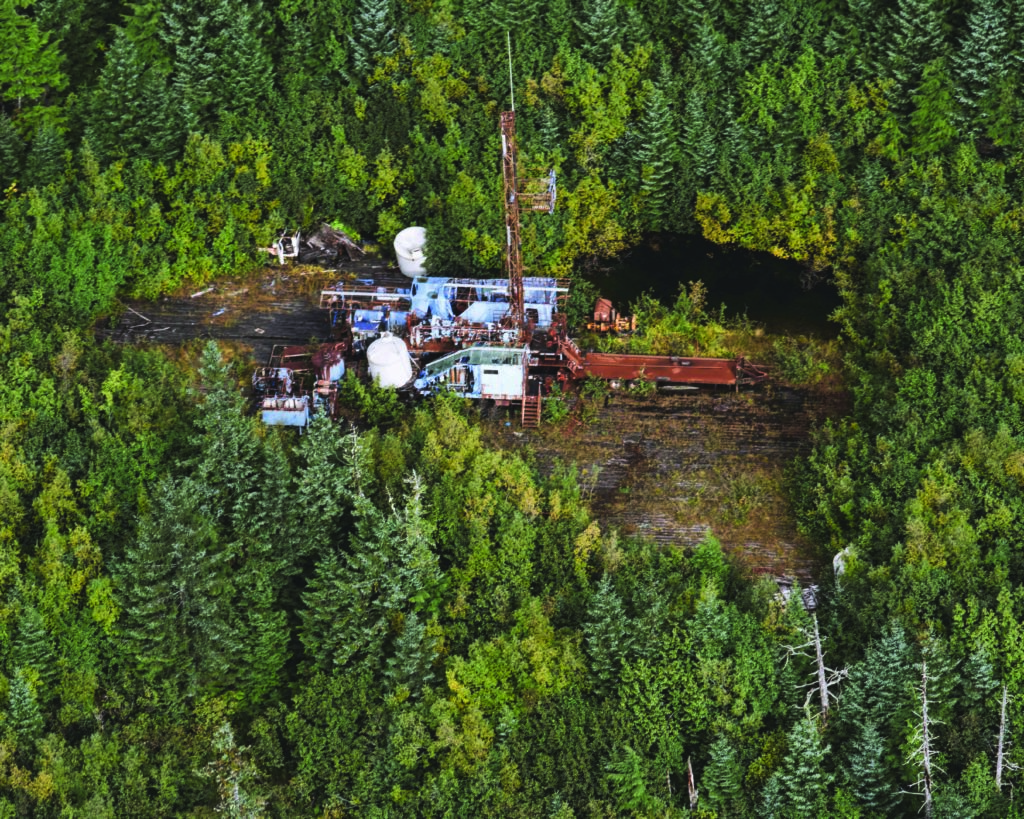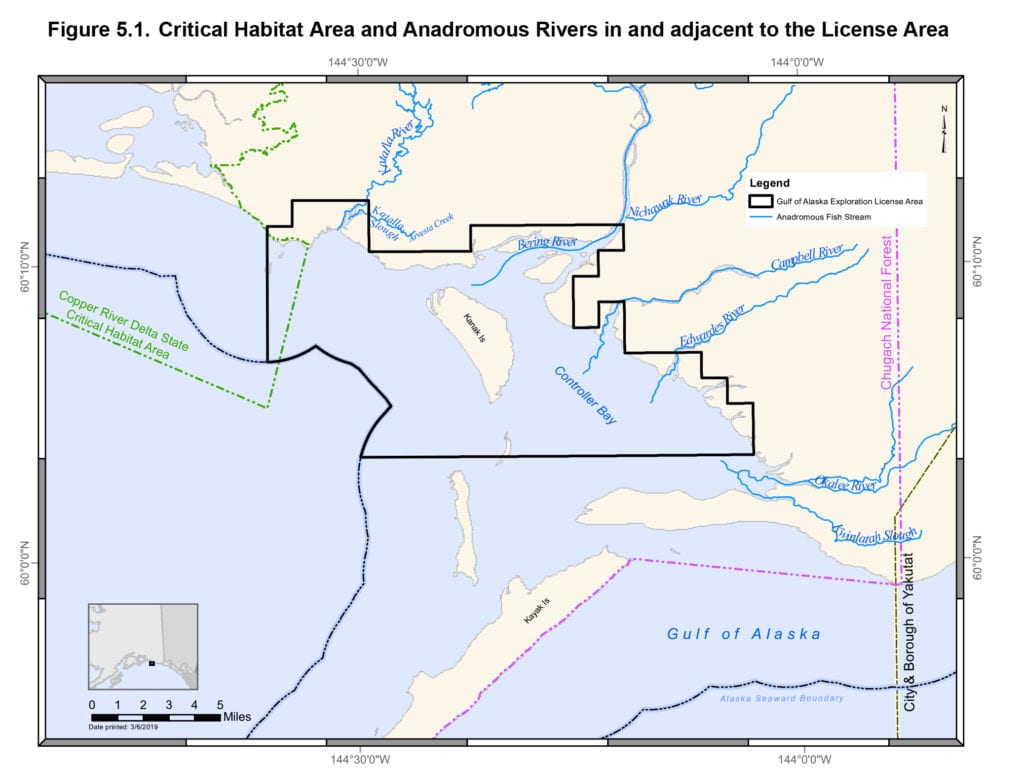
A preliminary state decision that would allow oil and gas exploration along the Gulf of Alaska shore faces mounting opposition from several Cordova entities.
That decision has prompted a call for community residents and harvesters of Prince William Sound’s abundant seafood to comment by Nov. 4 in response to the lengthy preliminary finding issued on Aug. 2 by the Alaska Department of Natural Resources’ Division of Oil and Gas.
Cordova District Fishermen United, the Copper River/Prince William Sound Marketing Association Prince William Sound Audubon Society, Copper River Watershed Project and Eyak Preservation Council issued a joint statement in late September after learning that the Alaska Division of Oil and Gas had issued a preliminary finding that allowing such exploration was in the state’s best interest.
The statement from these Cordova-based entities comes in the wake of a resolution passed by the Cordova City Council opposing issuance of a license for oil and gas exploration on or offshore of the eastern Copper River delta. The resolution cites concerns that restricting drilling facilities within 500 feet of documented fish waters or within a half-mile of the Katalla, Bering, NIchawak, Campbell, Edwardes and Okalee rivers offer insufficient protection from oil spills for spawning and rearing habitat for wild salmon.
The lengthy preliminary document is online at dog.dnr.alaska.gov.
Comments may be emailed to the Division of Oil and Gas at dog.bif@alaska.gov, or mailed to Best Interest Finings, 500 W. 7th Ave., Suite 1100, Anchorage, AK 99501.
The preliminary decision said that after weighing the facts and issues, the agency determined that issuing the Gulf of Alaska exploration license to Cassandra Energy Corp. of Nikiski is in the best interest of the state.
Efforts to reach Bill Stevens, president of the private firm, have so far not been successful. Stevens has had an interest in drilling in Katalla since the 1980s.
Opponents of the project said decaying buildings, drill sites and unlined oil pits from the failed forays are still at the site with which Cassandra Energy was involved in the early 1980s.

The preliminary finding notes that activities allowed by the license could impact salmon and other fish species, waterfowl, black bear, brown bear, moose and several species of marine mammals.
“Salmon are more sensitive to blasting from seismic testing and salmon eggs are extremely sensitive to the shock caused by blasting,” the report said. “Mitigation measures include and address disturbance avoidance, seismic activities, ands siting of facilities.”
“Several other important subsistence, sport, personal use and commercial uses of fish and wildlife could be affected by the licensed as well,” the report said.
The report also noted that “discharges of oil, gas and hazardous substances into the land, water, and air can harm habitats and fish and wildlife populations.”
The report also cited “economic benefits through jobs, increased property taxes and associate business opportunities and patronage” in the license area.
“Royalty and rental payment benefit all Alaska residents through payments to the General Fund and Permanent Fund,” the report stated.
Copper District Fishermen United has opposed oil and gas exploration and development along the northern Gulf of Alaska coastline for over 30 years.
“Commercial fishing is at the core of our community, both economically and culturally, and consistently, Cordova ranks among the top fishing ports nationwide,” CDFU said in its letter to the Cordova City Council. “The Copper River and Bering River district are active commercial fishing grounds, and stakeholders include the 537 Area E gillnet permit holders who participate in the commercial fishery within both of these districts.”
The report acknowledges cultural and historical significance of the area in question.
“This entire area is of high cultural and historical significance to our Eyak people and the Tlingit and Chugach tribes who inhabited the region,” said Dune Lankard, an Athabaskan Eyak fisherman and founder of Redzone a First Nations project created in the wake of the 1989 Exon Valdez oil spill.
“For thousands of years indigenous people thrived off the bounty of the wild food and wild salmon resources in Controller Bay and along the Gulf of Alaska all the way to Yakutat,” Lankard said.
“To sacrifice this sacred place that provides a subsistence and commercial fishing way of life for many that is comparable to none, for an oil bonanza dream that is based on greed and exploitation that benefits just a few would be a loss and mistake beyond belief, especially after what we are still living with in the wake of the Exxon oil spill,” he said.
Commercial fishermen in the region worry about extreme weather and difficult surf conditions in the proposed exploration area putting salmon at risk.
“As a commercial fisherman born and raised in Cordova, the absolute worst weather we see is in the Controller Bay and Katalla area,” said Mike Mickelson. “The regularity of extreme weather events makes it impossible to safeguard our world class salmon habitat.”
“The ocean is shallow and frequently is subject to high surf conditions for miles offshore. Under no circumstances should oil and gas permitting be allowed in this region,” he said. “The last attempts of oil development in the ’80s have still not been cleaned up, and it is extremely concerning that there is even consideration of allowing the same company access to this area again.”
The history of oil exploration at Katalla, documented in
“Crude Dreams,” by former Anchorage Borough Mayor Jack Roderick, dates back to
1900, the year that British oil expert Sir. Thomas Boverton Redwood began to
promote the oil potential there, on the northerly coast of the Gulf of Alaska.
Redwood urged the British consortium known as Alaska Steam Coal and Petroleum
Syndicate, Ltd. to drill its first well in the Katalla exploration for oil in
the Gulf of Alaska continued through the 1950s.





